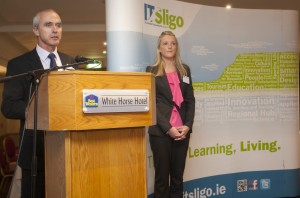Professor Terri Scott, President of IT Sligo, has urged Northern Ireland careers teachers to keep Institutes of Technologies (IoT) in the Republic “high on the radar” when advising students seeking professional degrees and a route to jobs in science, technology and related employment areas.
Addressing a conference of the Northern Ireland Schools and Colleges Careers Association (NISCA), in Derry, she said IoT sector had proved itself to be an innovative and popular dimension to Ireland’s higher education. In 2012, Institutes of Technology accounted for 47 per cent of all new entrants to higher education in the Republic.
Professor Scott said: “Given the quality of IoT courses, the array of third level options and the financial constraints that families face, I am advising the advisers to keep Institutes of Technology high on the radar and, of course, to open your students’ eyes to the benefits of undergraduate study at IT Sligo in particular.”
With more than 6,000 students on a 70 acre campus that had radically expanded over the past 40 years, IT Sligo today provides undergraduate, Masters and PhD degrees programmes, she told 130 careers advisors and teachers.
Highlighting last year’s formal launch by the Taoiseach, Mr Enda Kenny, of a new partnership between IT Sligo, Galway and Mayo IT (GMIT) and Letterkenny IT (LyIT), she said this “Connacht Ulster Alliance” is working to achieve the status of a Technological University.
Professor Scott pointed out that IT Sligo’s eclectic selection of courses equips students for careers in the STEM (science, technology, engineering and mathematics) industries and employment ranging from biopharmaceutical science to international marketing, childcare to archaeology, leisure management to forensic science, theatre design to web development.
And, stressing IT Sligo’s Institute’s commitment to courses that hold the prospect of well-paid graduate employment, she said NI students who choose to study there find that the costs involved are lower than in the UK.
She continued: “All the indicators are that one of the main routes to recovery lies in cultivating STEM skills.
“In our faculties of Business and Social Sciences, Science, Engineering and Design, IT Sligo collaborates closely with industry, commerce and the community and we are recognised leaders in online and distance learning, with a wide range of STEM programmes online.
“We provide, and constantly refresh, flexible programmes in our aim to meet the needs of students and employers for multi-skilled technology capabilities”.
But she also emphasised that, to reach their full potential, STEM industries need people with creative skills including designers, linguists, marketers, accountants and high-skill managers.
“That is why at IT Sligo, we are also advocates for another less well known acronym, STEAM. By injecting Arts into STEM, we are committed to creative technologies – and business too – in the wide blend of degree combinations that we offer.”
Caption for top photo: Professor Terri Scott, President of Institute of Technology Sligo, speaking at the Spring conference of the Northern Ireland Schools and Colleges Careers Association.
Caption for middle photo: Gerry Hegarty, Student Affairs Manager, IT Sligo, and Stephanie Fowley, Recruitment and Retention Officer, who took part in the NISCA conference.
Caption for bottom photo: Attendees at the NISCA Conference.